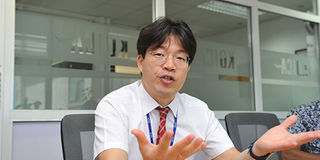Why South Korea plans to raise aid to Tanzania

Immediate former Korea International Cooperation Agency Country Director Joonsung Park speaks during an interview with The Citizen. Photo | The Citizen Correspondent
What you need to know:
Between 2002 and 2015, Korea ODA to Tanzania totalled $80 million, with a significant amount (almost 70 per cent) of the ODA supports the health sector through various funding modalities including the basket fund.
Dar es Salaam. Tanzania’s impressive performance in health indicators over the past decades has drawn the attention of development partners, this time from South Korea, which during the 1960s it had the same level of development as Tanzania’s.
According to immediate former Korea International Cooperation Agency (Koica) country director Joonsung Park, Tanzania is one of the South Korea’s priority countries in terms of development support.
“Tanzania is ranked the second among 16 African countries in Koica support. The first on the list is Ethiopia,” Joonsung said during a recent interview.
“Over the years, Koica has successfully adapted its programmes to changing international trends in developing assistance and cooperation in order to effectively provide support in areas where Korea has comparative advantage.” In strengthening its support through Official Development Aid (ODA) to developing countries, Koica has established 49 overseas offices in 46 countries with 213 development cooperation projects amounting to $1 billion annually in 54 countries.
Established in Tanzania in 2002, Koica has been involved in providing grant and technical assistance in supporting development programmes in the health sector among other priority areas. “The main objective of our agency is to support poverty eradication and sustainable socioeconomic development programme in developing countries,” he said.
Between 2002 and 2015, Korea ODA to Tanzania totalled $80 million, with a significant amount (almost 70 per cent) of the ODA supports the health sector through various funding modalities including the basket fund.
According to him, the agency has for the past two years provided development support aid of around $20m annually to Tanzania. “The amount covers almost everything, like project budgets and human resources from Korea coming to Tanzania to transfer their know-how and expertise.”
In terms of strategy for Tanzania, Koica supports main three sectors: health, education as well as water and sanitation.
“Koica Tanzania interventions in education and health sectors have developed approaches that address holistically several confounding factors in maternal, newborn, child and adolescent health,” he said. The approaches call for multi-sector actions to improve health and education status of women, adolescent girls and children.
The agency has constructed a modern maternity hospital at Chanika, Dar es Salaam. The facility, installed with high-tech equipment, can accommodate more than 150 mothers and their newborns. “In many places in Tanzania expectant mothers and the newborns have to share beds in hospitals. This is a very much undesirable situation that is why we supported the building of the hospital with a slogan ‘One Mother One Bed’ in a bid to promote the project, which symbolises quality care for mothers,” he explained.
Data show that some 454 mothers out of 100,000 die each year in Tanzania due to pregnancy-related complications. Also newborns constitute about 50 per cent of all under-fives’ deaths.
“Many expectant mothers die from the lack of very simply treatment, for example the lack of or inadequate blood, the lack of transport to health centres. It is expected that mothers should have safe delivery. But when they develop some complications, emergency response is not really good enough to take care of the situation. This made the maternal mortality rate be high. This made Koica, along with other development partners, to put priority on saving the lives of expectant mothers and their newborn.”
He hopes that the upgrading of the then Chanika Dispensary into the Maternity Hospital at a cost of about $4.5 million will improve maternal and newborn child healthcare, complementing government efforts to reduce maternal and neonatal deaths.
The hospital has been designed in a logical way. Delivery wards have been constructed next to operating theatre unlike in many other hospitals where the delivery wards and the operation theatres are far apart. In this case, it takes a bit of time to transfer expectant mothers to the operating theatre when there is a complication during delivery.
“Many hospitals in Tanzania delivery wards are far apart or separate from operating theatres. So when something urgent happened during delivery expectant mothers have to be carried out through outside. This looks so inefficient and unreasonable. So we designed the hospital in such a way that delivery wards are next to operating theatres for quick and prompt response from medical doctors.”
The project also involves other components, including capacity building of healthcare workers to ensure the provision of health services that were not available at the dispensary level. Such services include OBGYN ultrasound, high risk mother care, antenatal and postnatal care, Kangaroo mother care, anaesthesia and outpatient services. Staff houses have also been constructed to ensure the availability of health providers in case of emergency cases. “The project has also invested in an extensive capacity building programme that train some 78 medical staff in anaesthesia, OBGYN ultrasound, basic emergency obstetric and neonatal care and comprehensive emergency obstetric and neonatal care, theatre management as well as in providing quality maternal and newborn child health services.
Residents of Chanika and surrounding areas would be able to receive better health care at the facility whose construction has been completed and services are being provided already. Plans to officially inaugurate it this month are underway.
A range of beneficiaries of Koica health funded project are not confined to Chanika, with over 43,000 people.
Koica and UN agencies have funded various other health projects in various parts of Tanzania.
With funding of $5.6 million from Koica and Unicef undertake a project, known as “Saving Mothers and Children’s Live through innovative, Sustainable and Comprehensive Reproduction, Mother, Child and Adolescent Health Services in Mbeya and Songwe regions.
“Apart from the provision of ambulances, medical equipment and supplies, the project involves renovation of 30 strategic health facilities in the regions to provide quality services for mothers, newborns and under-fives,” he explained.
Strengthening Comprehensive Emergency Obstetric and Neonatal Care is one of the vital components of the project which started in 2013 and is expected to end this year.
“Some 154 health facilities in the regions will be strengthened for Basic Emergency Obstetric and Neonatal Care and youth-friendly services.
“A unique feature of this project is the use of mobile application to register pregnant mothers into a system and provide information concerning the health of pregnant mothers and newborn babies.”
Apart from the project in Songwe and Mbeya regions, Koica has also funded a maternal health project in Kishapu District, Shinyanga Region, to reduce maternal mortality rates in the district caused by pregnancy complications. The three-year project started. “The project’s key interventions include enhancing medical infrastructure and human resources of 48 health facilities in 124 villages.”
Last year, Koica teamed up with UNFPA to initiate a Reproductive, Maternal, Neonatal and Child Health (RMNCH) project in Simiyu Region. The two-year project is funded by Koica at the tune of $5 million. It aims at improving access to equitable, acceptable and affordable quality RMNCH services, he said.




